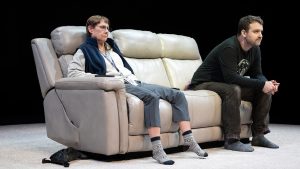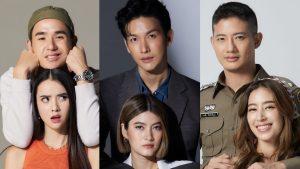
Japanese filmmaker Chie Hayakawa made a quiet but unforgettable entrance onto the world stage with her 2022 feature debut Plan 75, a haunting dystopian vision of state-sponsored euthanasia for the elderly. Selected for Cannes’ Un Certain Regard section, the film earned the Camera d’Or Special Mention and introduced Hayakawa as a director with an artfully restrained style and a compassionate eye for human frailty. Now, just three years later, she returns to the Croisette with Renoir, an intimate and emotionally charged childhood drama that marks her first appearance in the festival’s main competition.
Where Plan 75 was shaped by conceptual clarity and allegorical heft, Renoir is rooted in something looser and more elusive: the spontaneous feelings and fractured memories of childhood. Set in suburban Tokyo in 1987, the film centers on 11-year-old Fuki, a sensitive girl who retreats into her imagination as she watches her father succumb to terminal cancer and her small family fracture under the weight of impending grief. As her parents struggle with sorrow in their own isolated ways, Fuki becomes adorably fixated on telepathy and the occult, convinced that she can bridge the emotional chasms around her through the invisible powers of the mind.
For Hayakawa, Renoir is both a deeply personal film and a deliberate departure. “I wanted to take a different approach this time,” she explains. “Rather than building the film around a clear concept or message, I began with fragments — emotions and images from my own childhood — and allowed the story to emerge organically.” Hayakawa’s own father died of cancer when she was young, and many of Fuki’s shifting feelings — guilt, yearning, fear and awe — mirror the director’s own conflicted experiences from that time.
“I’m trying to look at my childhood with compassion,” she says. “To acknowledge the loneliness, the confusion, the selfishness—and still find a way to forgive myself and connect with others.”
Despite its period-specific setting, Renoir resists nostalgia and sentimentality. Hayakawa says she chose 1987 not just because she was the same age as Fuki then, but because it was a pivotal moment in Japan’s postwar identity — at the height of the country’s economic bubble, when material excess masked a growing sense of spiritual emptiness. “It was a time when people were intoxicated by prosperity but also deeply lonely,” she explains. “I wanted to portray how fragile and precious people are, especially when they’re quietly breaking apart.”
The title Renoir refers to the French impressionist Pierre-Auguste Renoir’s painting “Little Irène,” a replica of which Fuki demands her father buy her in the film. The connection there is also personal: Hayakawa’s father bought her the same print when she was a child, and the image has stayed with her ever since.
“The story’s connection to the painting or to Renoir the artist doesn’t run deeper than that,” she says. “Among the great impressionists, Renoir is particularly popular in Japan, and in the 1980s replicas of his paintings could be found on the walls of many homes. Such replicas were a symbol of Japan’s admiration of the West at the time and its desire to ‘catch up.’”
Produced by Tokyo-based Loaded Films, Renoir reunites many of Hayakawa’s trusted collaborators from Plan 75, including DP Hideho Urata, composer Rémi Boubal, and editor Anne Klotz. The cast features a stunning breakout performance from 11-year-old Yui Suzuki, alongside pair of Japan’s most accomplished veteran actors, Lily Franky (Shoplifters, Like Father, Like Son) and Hikari Ishida.
The Hollywood Reporter connected with Hayakawa in Japan ahead of Renoir‘s world premiere.
Where did the premise and your approach to Renoir come from?
My previous film, Plan 75, was structured around a very clear concept. You know, you make a film because you want to express something that can only be said cinematically. But after I finished Plan 75 and started doing interviews, I sort of had to explain the premise and the social issues in Japan that inspired it over and over. And that kind of wore me out, and sometimes I doubted my explanations about the film. So I wanted to take a different approach this time and see what kind of film I would make if I started a project without having a clear vision. Instead of a concept or issue-driven film, I wanted to make something purely emotional. When I started writing the script it was just a collection of all these little episodes I had been thinking about since I was a teenager. They didn’t really connect to each other at all, and I didn’t have any strong concept or premise to tie them together.

Loaded Films
So you deliberately made a film that you wouldn’t be able to articulate in words — and now I’m going to ask you to explain it all in words. Hmm.
(Laughs) That’s okay.
So how did you find your way to a story?
It was very difficult. There were originally a lot more characters in it, but over time I narrowed down all of the episodes until it came to portray one summer in one little girl’s life. But I still didn’t really have a concrete theme in the beginning, or even during the process of writing and shooting. It wasn’t until the editing phase that I realized maybe it was a story about this girl who doesn’t quite have compassion for others, but then she gradually learns what real pain is — and through that pain, she takes one step towards adulthood. But that only came to be by linking all of the little episodes that make up the movie. As I was doing it, I felt like I was making some kind of sculpture out of clay — trying to shape something, but I don’t know what it is. Only through the process of actually making the film did the story take shape.
I imagine it could be quite scary to go that deep into making a film without yet knowing what it’s really about.
It was really stressful, but fun too — because I really didn’t know what the result would be. Sometimes I was totally without confidence, and other times I simply enjoyed looking forward to seeing what the film would turn into. On the first day of the shoot, I held a meeting with my whole team and said, “To be honest, I’m not sure if this movie is going to be any good.” Gradually, though, by working with my creative team and the actors, I started to feel it — that there was going to be a very strong film there. But I still couldn’t see the full picture, and that was quite exciting.
We have to talk about your lead actress, Yui Suzuki, who plays 11-year-old Fuki. She’s a revelation. She seems like a true natural. How’d you find her?
So, I was aware that the casting of Fuki would be the most important part of making this film. So I was expecting to audition hundreds of kids. That’s what I was prepared for. But Yui was the very first girl we had come to audition. She had appeared in a college student film that was shown at an Independent film festival in Japan, and one of my producers had done the translation and English subtitling for that film, and another producer was a member of the jury at that festival and had seen it. Both of them eagerly recommended her to me, saying she’s really good. So we called her in to audition and I immediately thought she’s amazing and could be the one. But she was the very first person we had seen, so I thought, “I can’t decide already, I have to see more girls.” So we held many more auditions but Yui was always on my mind, and after one or two months, I just said, “Okay, yes, Yui is the one.”
Had you worked with child actors before? How did you approach your collaboration with her? It’s such a sensitive performance.
No, this was the very first time for me to work with a child actor. She started modeling when she was a baby, so she’s incredibly comfortable in front of a camera. It’s like she doesn’t even feel it. During one of our first conversations, I asked her, “What are your strengths?” And she said, “I’m really good at imitating animals.” And then she did an amazing horse sound, and a cat, and a sheep — and they were all perfect. Her reaction was so instinctual. So I immediately wrote that into my script. There were so many things about her that inspired me, lots of details that made it into the script. She was a big source of inspiration.
But it was my first time working with a kid, so I was reading lots of books and interviews with directors about different approaches to working with child actors. Some directors work with them from a script, and others rely entirely on improvisation and even do things to make them cry when necessary. But I really wanted to respect her as a collaborator. She was already 11 years old and I thought she should understand the nature of the project she’s involved in. So I tried to explain the story and the style of the film to her as much as I could. But as I said, I was still grasping at it myself. One of my biggest influences for this project was the Spanish film, The Spirit of the Beehive [by Víctor Erice]. So I sent Yui a DVD and asked her to watch it, and explained to her that the film we are trying to make is not like anything you usually see on TV in Japan.
What was her reaction?
She said it was her first time watching a foreign film and that she was kind of scared beforehand. But she said she really loved it, and that she understands that it seems difficult, but that we’re trying to understand the feelings of kids — and she really liked that.
And how did you work with her on set?
Once we started doing rehearsals and shooting, I realized that she really didn’t need my direction at all. I didn’t really direct her in any detail. I would just say, “This is the situation, and you can just walk this way and then sit down over there” — really simple things like that. I didn’t really need to explain to her how she should feel, or what kind of face she should make, or anythign like that. She’s very natural and she would add clay to the sculpture in her own way. I really came to trust and rely on her. She’s a real artist.
You’ve mentioned how you deliberately wanted to make a film quite different from Plan 75. But I have to say, I did see some real continuity between the protagonists — particularly Chieko Baisho’s character near the end of Plan 75. There’s sort of an existentialist quality, or a mindfulness and sensory joy in the way your protagonists relate to their world. They struck me as similar characters who happen to be on opposite ends of the lifespan.
Fuki and the protagonist of Plan 75, they both appear passive in a way. They always seem to be just taking things in — the people and the situations around them — but we also get a strong sense of emotion from them somehow. We feel their spirit. So, in that sense, I agree that there’s a real connection between these characters. Of course, there’s a shared sensibility because they were both created by the same writer/director, I suppose.
I have to say, even though we’ve only met a couple of times, I found that Yui kind of looks like a young version of you — and even has a similar vibe to you. Did you see her as your avatar to an extent?
(Laughs) Well, not really. When I was casting the protagonist, I remember thinking that the most important quality was that she had to be very attractive. Not that she needed to be beautiful — not in that way — but she should have a quality where people can’t help but keep watching her. I didn’t at all try to find someone who looks like me, but during the shoot, some of my collaborators did say to me, “Hey, Fuki kind of looks like you.” But I really didn’t aspire to make an autobiographical movie. If anything, I think maybe I started subtly imitating her, because I was always studying her so closely through the monitor on set. You know when you spend a lot of time with someone, you start unintentionally imitating their facial expressions? It may have partly been that.
A core observation I kept returning to while watching the film is the way children feel things very intensely but seldom have the intellectual framework or language to understand and communicate what they’re going through. So I just loved how you used dream sequences as a way of gaining access to Fuki’s emotional world. At the beginning, she’s going through some very tough emotional moments without really realizing it, and she has quite strange and scary nightmares. By the end, when she finally gets a warm hug from a teacher who recognizes what she’s going through — and she gets to enjoy a happy day of playing at the beach — we get that adorable, cheerful dream of Fuki aboard a glamorous boat party — which is just the sort of thing you would hope for a little girl to dream about. I don’t really have a question here, but you handled all of that so elegantly — it makes me teary-eyed just thinking about it.
Well, I’m really happy to hear that, because I’ve gotten a lot of comments from people asking why those scenes are in there, or what they are supposed to mean. So that’s a relief.
Do you see yourself as part of a humanist filmmaking tradition in Japan? For example, it seems inevitable that Hirokazu Kore-eda will be referenced in discussions of this film — especially in Cannes, where he’s a regular — because of its tone and the graceful foregrounding of a child actor.
Yes, I’m expecting that people will refer to Kore-eda-san, because of the theme and the child actor part. I even cast Lily Franky, who is one of his regular actors. I myself feel Kore-eda-san’s influence. I got to know his films when I was a high school student and I love his work. But an even bigger influence on this film was Somai Shinji’s Moving. I reference that film a lot. As for the visual style, before shooting I spoke with my DP a lot about Moving, The Spirit of the Beehive and Edward Yang’s Yi Yi. So there are several direct influences.
So, after debuting in Un Certain Regard three years ago with Plan 75, you’re in Cannes main competition with Renoir this year. It seems you’re fast becoming a member of “the Cannes family” as Thierry Frémaux likes to call it. How are you feeling about it all?
When I first saw my name among all of those other amazing directors on the competition lineup, it felt surreal. Of course, I’m honored, but so far, it just feels very weird. It doesn’t seem real yet.
#Chie #Hayakawa #Revisiting #Pain #Childhood #Renoir






